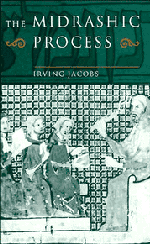Book contents
- Frontmatter
- Contents
- Preface
- Abbreviations
- 1 What is ‘Midrash’?
- 2 Traditional motifs in early rabbinic exegesis I: Job and the Generation of the Flood
- 3 Traditional motifs in early rabbinic exegesis II: Job and Israel's early history as a nation
- 4 Popular legends and traditions I: the archetypal sage
- 5 Popular legends and traditions II: the archetypal priest-king
- 6 Popular legends and traditions III: the regenerating tree
- 7 The midrashic background for James 2:21–23
- 8 Elements of Near-Eastern mythology in rabbinic Aggadah
- 9 Conclusions
- Appendices
- 1 Job and the Generation of the Flood
- 2 Job and Israel's early history as a nation
- 3 The archetypal sage
- 4 The archetypal priest-king
- Select bibliography
- Index of sources
- Index of names
- Index of subjects
1 - Job and the Generation of the Flood
Published online by Cambridge University Press: 05 November 2011
- Frontmatter
- Contents
- Preface
- Abbreviations
- 1 What is ‘Midrash’?
- 2 Traditional motifs in early rabbinic exegesis I: Job and the Generation of the Flood
- 3 Traditional motifs in early rabbinic exegesis II: Job and Israel's early history as a nation
- 4 Popular legends and traditions I: the archetypal sage
- 5 Popular legends and traditions II: the archetypal priest-king
- 6 Popular legends and traditions III: the regenerating tree
- 7 The midrashic background for James 2:21–23
- 8 Elements of Near-Eastern mythology in rabbinic Aggadah
- 9 Conclusions
- Appendices
- 1 Job and the Generation of the Flood
- 2 Job and Israel's early history as a nation
- 3 The archetypal sage
- 4 The archetypal priest-king
- Select bibliography
- Index of sources
- Index of names
- Index of subjects
Summary
ROBBERY AND VIOLENCE
In addition to the sources cited above on this subject, there is the following passage recorded in Genesis Rabbah 27:3 (see also the parallels cited by Theodor, p. 257). This source is noteworthy as it involves further verses from Job 24. In a sermon to the community of Sepphoris, R. HḤanina cited verses 14 and 16 to illustrate the deceitful methods employed by the Generation of the Flood in perpetrating their crimes, with unfortunate consequences:
‘ [… and that every imagination of the thoughts of his heart] was only evil all the day. (Genesis 6:5)’ – from the moment that the sun shone until it set, there was nothing to hope for in them! Thus it is written, ‘The murderer riseth with the light to kill the poor and the needy; and in the night, he is like a thief.’ (Job 24:14) But surely it is written ‘In the dark they dig through houses’?! (ibid. 16 – which implies that they actually committed robbery). Why [then does it state ‘like a thief’]? Because [they robbed houses] ‘which they had marked out for themselves by day (ibid.)’. What did the Generation of the Flood used to do? They would bring balsam and rub it on the stones of the houses they intended to rob, then return by night, smell out the house and break in! Thus R. HḤanina expounded in Sepphoris and that same night three hundred house-breakings were effected! (═).
- Type
- Chapter
- Information
- The Midrashic ProcessTradition and Interpretation in Rabbinic Judaism, pp. 173 - 178Publisher: Cambridge University PressPrint publication year: 1995



